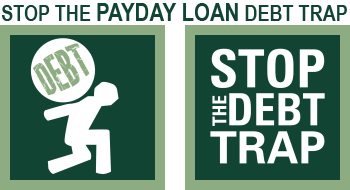
Highlights
The Little Guys Win One on Payday Loans
October 23, New York Times
Since the federal Consumer Financial Protection Bureau opened its doors in 2011, the agency’s investigations and enforcement actions have returned more than $12 billion to auto buyers, homeowners, credit-card holders and other borrowers who were victimized by deceptive or predatory practices. Consumers who have been trapped in debt by the notorious payday lending industry will now get extra help from the bureau with a rule imposed this month.
Cost of Living: Payday Loans Leave some Hoosiers Bankrupt, Attorney Says
October 20, WRTV Indianapolis
Payday loans, even a small amount, could end up costing you thousands in the long run, according to Indiana financial experts and a south side man who ended up filing for bankruptcy as a result of payday lending.
Top Stories
Illinois sues payday lender over low-wage workers forced to sign noncompete agreements
October 27, The Chicago Tribune
The Illinois attorney general’s office is suing Check Into Cash, a national chain of payday lending stores, for allegedly forcing low-wage employees to sign noncompete agreements in violation of state law.
More Coverage: The Seattle Times
Sen. Heinrich Applauds CFPB for Rule on Payday Loans
October 25, Financial Regulation News
Sen. Martin Heinrich (D-NM), ranking member of the Joint Economic Committee, praised the Consumer Financial Protection Bureau’s (CFPB) final rule to establish borrower safeguards on payday loans.
There are Alternatives to Payday Loans and Other Predatory Lending
October 24, Chicago Tribune
Approximately 10 million to 12 million people depend on payday loans. Most traditional financial institutions are not very interested in low-income borrowers and accordingly do not now offer loan products that will satisfy their needs.
New payday rules good for consumer
October 24, San Antonio Express-News
We urge Congress to leave in place new payday lending regulation recently announced by the Consumer Financial Protection Bureau.
Stretch Your Dollar: New Rules for “Payday Loans”
October 24, WTNH Connecticut News
New rules are in place for people who take out so-called “payday loans.” We’re stretching your dollar with what you need to know. Quick cash comes with some new rules this month but will not go into effect until July 2019. The Consumer Financial Protection Bureau issued new regulations for those high interest payday loans.
Ralph Nader: Trump’s Anti-Consumer Agenda Hurts His Voters
October 23, The New York Times
As a candidate, Donald Trump promised regular people, “I will be your voice,” and attacked the drug industry for “getting away with murder” in setting high prices for lifesaving medications. But as president, he has declared war on regulatory programs protecting the health, safety and economic rights of consumers. He has done so in disregard of evidence that such protections help the economy and financial well-being of the working-class voters he claims to champion.
Vermont Helps Feds Stop ‘Payday Loan’ Debt Traps
October 23, Vermont Business Magazine
The federal Consumer Financial Protection Bureau (CFPB) has announced (link is external) a national rule that will eliminate payday loan debt traps by requiring lenders to ensure that borrowers can repay their loans. Vermont already bans payday loans and other forms of high-interest lending. Around 12 million Americans use payday loans. The new rule is estimated to eliminate two-thirds of the payday loans currently offered across the country.
Op-Ed Utah Families Need Payday Lending Reform
October 21, Deseret News
Last week saw an important development in the long simmering public debate over “payday” lending. As most Utahns know, payday loans are relatively small loans, typically about $375, lent with an agreement to repay when the borrower receives their next paycheck. Payday loans have extremely high interest rates averaging about 400 percent per year.
Civil Rights Leaders Support Rules to Crackdown on Payday Lending
October 21, Precinct Reporter Group
After five years of field hearings, town hall meetings, multiple research reports, and over one million comments, the Consumer Financial Protection Bureau (CFPB) announced on October 5 a new rule to rein in predatory payday and car-title loans.
Reposts: Pittsburgh Courier, Michigan Chronicle, Atlanta Daily, Indianapolis Recorder
Coalition Fights to Push to Expand Payday Lending in Michigan
October 21, Michigan Public Radio
Thousands of Michiganders have become trapped in a cycle of debt after resorting to high interest, short-term loans to make ends meet, and advocates for the financially vulnerable say a new package of bills would make matters much worse. The state Senate is considering three bills – SB 430 , SB 431 , and SB 432 – that would allow so-called payday lenders to increase the amount and duration of the loans they can offer to $2,500 for up to two years.
Rule Aims to Protect Mass. Residents From Payday Loan Abuses
October 20, Spare Change News
Consumer advocates are praising a new rule issued on Thursday by the Consumer Financial Protection Bureau that requires payday lenders to start verifying a borrower’s ability to repay the loan before rolling it over into a new loan.
CFPB Rules to Crackdown on Payday Lending High-Fived
October 20, Euroweb
After five years of field hearings, town hall meetings, multiple research reports, and over one million comments, the Consumer Financial Protection Bureau ( CFPB ) announced on October 5 a new rule to rein in predatory payday and car-title loans.
FTC Obtains $4.1 Million Judgment Against Seller of Fake Payday Loans
October 20, JDSUPRA
On October 17, 2017, the Federal Trade Commission (FTC) announced that it obtained a $4.1 million default judgment from the U.S. District Court for the District of Kansas against a phony debt collection operation that sold lists of fake payday loan debts to debt collectors. According to the FTC, the operation harassed consumers for debts they did not owe and successfully persuaded some to pay the fake debts.
